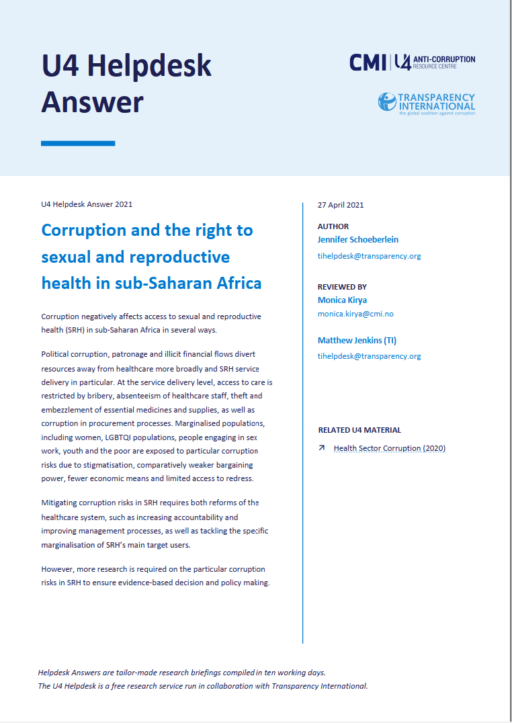- Home
- Anti-Corruption Helpdesk
- Corruption and the right to sexual and reproductive health in sub-Saharan Africa
Corruption and the right to sexual and reproductive health in sub-Saharan Africa

This Anti-Corruption Helpdesk brief was produced in response to a query from a U4 Partner Agency. The U4 Helpdesk is operated by Transparency International in collaboration with the U4 Anti-Corruption Resource Centre based at the Chr. Michelsen Institute.
Query
Please provide an overview of how corruption affects sexual and reproductive health rights (SRHR) in sub-Saharan Africa (SSA), as well as potential mitigation strategies
Summary
Corruption negatively affects access to sexual and reproductive health (SRH) in sub-Saharan Africa in several ways.
Political corruption, patronage and illicit financial flows divert resources away from healthcare more broadly and SRH service delivery in particular. At the service delivery level, access to care is restricted by bribery, absenteeism of healthcare staff, theft and embezzlement of essential medicines and supplies, as well as corruption in procurement processes. Marginalised populations, including women, LGBTQI populations, people engaging in sex work, youth and the poor are exposed to particular corruption risks due to stigmatisation, comparatively weaker bargaining power, fewer economic means and limited access to redress.
Mitigating corruption risks in SRH requires both reforms of the healthcare system, such as increasing accountability and improving management processes, as well as tackling the specific marginalisation of SRH’s main target users.
However, more research is required on the particular corruption risks in SRH to ensure evidence-based decision and policy making.
Contents
- Background
- Corruption risk factors across the healthcare value chain
- Corruption risk factors affecting SRHR’s target recipients
- Mitigating corruption risks in SRH service delivery
- References
Main points
— Sexual and reproductive health rights challenges in SSA include limited access to maternal health, high maternal and infant mortality, high rates of HIV infections and unsafe abortions.
— Challenges are compounded by weak healthcare systems, healthcare funds lost to corruption and restricted access for patients due to petty corruption.
— Women, youth, the rural poor, sex workers and LGBTQI individuals face some of the biggest challenges in realising their SRHR due to stigmatisation, economic weakness and a lack of political power.
— Limited accountability and transparency in the healthcare system and vulnerabilities of patients facilitate corruption in SRH service delivery.
— As yet, insufficient and inadequate data hampers evidence-based decision and policy making
Authors
Jennifer Schoeberlein, [email protected]
Reviewers
Monica Kirya (U4 Anti-Corruption Resource Centre)
Matthew Jenkins (Transparency International)
Date
27/07/2021

